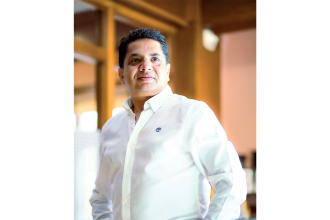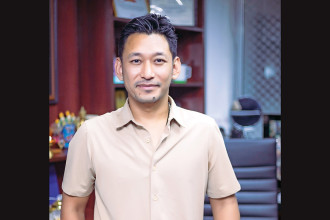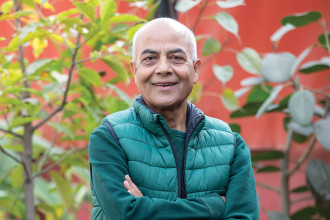-1727431490.jpg)
Purushottam Ojha, a former Commerce Secretary of Nepal, has made remarkable contributions to trade, transit, investment and institutional development throughout his career. As a consultant in these critical areas, Ojha has played a pivotal role in shaping Nepal’s economic landscape. His expertise extends to significant projects, notably the Nepal Multimodal Transit and Trade Facilitation Project, where his leadership was instrumental in its success. Ojha’s career is marked by his dedication to improving trade infrastructure and negotiating international agreements. His efforts in the rail service agreement between Nepal and India are a testament to his skill and perseverance, overcoming significant challenges to enhance cross-border trade. In recognition of his outstanding contributions, Ojha was honoured with the Suprabal Gorkha Dakshinbahu Medal in 2000.
Ojha’s journey from a rural upbringing to a key figure in Nepal’s civil service exemplifies his commitment to service and development. His work has had a lasting impact on Nepal’s trade and transit sectors, showcasing his unwavering dedication and expertise in advancing the nation’s economic progress.
In this edition of Business 360, Ojha shares the five things that have impacted his work and life.
The pursuit of education
I was born in a small village in Tanahun district, near Damauli. Growing up, I faced many challenges in pursuing an education due to the lack of nearby schools. My father, a retired civil servant, took on the role of a teacher for me and my brothers during the early years. Despite his dedication, I knew that to further my education, I would need to leave home.
At the age of 12, I began attending Min High School which was a three-hour walk from our village. To manage the long distance, I rented a place closer to the school but this separation from my family was difficult. I missed the everyday presence of my parents, especially my mother whose care and support I had relied on throughout my early years. The distance made me feel somewhat detached from them and I often longed to be closer to home.
After graduating from Min High School in 1970, I moved to Kathmandu to pursue higher education. Despite the new opportunities that the city offered, the sense of being far from my family remained. I completed my Intermediate of Science (ISc) at Anandakuti Science College and later pursued a Bachelor’s in Agriculture from Rampur, Chitwan, followed by degrees in public administration and sociology from Tribhuvan University.
Joining the Nepal Civil Service in 1979 marked a significant milestone in my career. While the journey of education and career advancement often meant being away from home, these experiences helped me grow and become more self-reliant. Although the physical distance from my family was challenging, their support and encouragement were always with me in spirit, and they played a crucial role in shaping my determination and success.
Choosing civil service
When I was young, I dreamt of becoming a medical doctor but circumstances led me in a different direction. Although I couldn’t pursue medicine due to my grades, I found myself in agriculture and civil service. My career wasn’t a straight line, it had its twists and turns but I am proud of the path I took. Starting as a Section Officer, I gradually worked my way up to Joint Secretary and finally became Secretary in 2007. While I didn’t achieve my childhood dream, I have no regrets. Being able to serve my country at the highest level of the civil service has been incredibly fulfilling.
Family: bedrock of love and support
I have always believed in simple living, honesty and serving others. From the start, I wanted to be a person who helped those in need and carried out my duties with integrity. I am proud that I have lived up to those values, serving my country with diligence and humility.
However, I couldn’t have done any of this alone. My family has been the bedrock of my life, offering unwavering support and encouragement. My wife, Chanda, has always stood by me, providing not only emotional support but also pushing me to pursue my ambitions and dreams. From the early days of my studies to the more challenging moments in my career, she was my constant companion, always reminding me of the importance of perseverance. Her belief in me helped me stay focused, especially when things seemed difficult.
Our two sons have also been an immense source of pride and inspiration. Watching them grow into hardworking, principled individuals has been one of the greatest joys of my life. During my exams and throughout the more demanding phases of my career, their hard work and dedication motivated me to push myself even further.
As I reflect on my life, I am grateful for the family we have built together. We have created a bond rooted in mutual respect, love and shared values, and I believe that this strong family foundation has been instrumental in my personal and professional growth. My journey would not have been the same without their love and support, and I am incredibly proud of what we have achieved together.
“Throughout my career, I have been guided by the principles of honesty, hard work and ethical behaviour. I never sought the most prestigious postings, nor did I attempt to curry favour with those in power. Instead, I focused on the job at hand, doing it to the best of my ability, always believing that the quality of my work would speak for itself. For me, success has never been about the titles I have held or the accolades I have received, but rather about achieving my goals while staying true to my values”
Persevering to achieve goals
One of the most significant achievements in my career was the successful negotiation of the rail service agreement between Nepal and India. This task was part of the broader project to develop the Nepal Multimodal Transit and Trade Facility, which included constructing inland clearance depots in Birgunj, Biratnagar and Bhairahawa, and implementing customs automation systems.
The negotiation process was challenging, particularly following the hijacking of Indian Airlines flight IC814 in December 1999. The heightened tensions made it difficult to persuade the Indian side to cooperate on the rail service agreement. Despite numerous rounds of negotiations and significant scepticism from the Indian government, we persevered. After nearly two years of persistent efforts, we successfully signed the agreement in 2004.
This accomplishment was not solely my own but a collective effort. The success of this project was due to the hard work and dedication of the entire team involved. While I played a role in guiding the negotiations and facilitating the agreement, the credit for this achievement belongs to all those who worked alongside me. Their commitment and expertise were instrumental in overcoming the obstacles and ensuring the project’s success.
A career built on efficiency, transparency and accountability
Throughout my career, I have been guided by the principles of honesty, hard work and ethical behaviour. I never sought the most prestigious postings, nor did I attempt to curry favour with those in power. Instead, I focused on the job at hand, doing it to the best of my ability, always believing that the quality of my work would speak for itself. For me, success has never been about the titles I have held or the accolades I have received, but rather about achieving my goals while staying true to my values. I have always believed that leadership is not just about holding a position of power but about guiding your team, mobilising them towards a shared vision, and maintaining an unwavering commitment to integrity.
Looking back, I hope to be remembered as an honest civil servant who worked tirelessly to uplift not just the civil service but also the nation’s economy. One of my proudest achievements has been contributing to the modernisation of Nepal’s trade and transit systems. The Nepal-India rail service agreement, which I led, is a highlight of my career, but the real legacy lies in the long-term economic benefits it created for the country. I take immense pride in knowing that my efforts helped improve Nepal’s logistics, trade and connectivity, positioning the nation for future growth.
However, I have also learned through experience that being honest and hardworking isn’t always enough in a system where favouritism, nepotism and political influence often dominate. It is disheartening to see deserving individuals sidelined in favour of those who played unfairly or used their connections to rise to higher positions. This is one of the greatest challenges facing our civil service and, indeed, our entire society. Many talented and capable people are overlooked simply because they choose to uphold their values rather than engage in opportunistic behaviour.
I firmly believe that we must work to change this ecosystem. We need to create a system that rewards merit, values ethical conduct and recognises the importance of fairness in decision-making. Our civil service and our country as a whole would greatly benefit from a shift where people are promoted based on their skills, experience and commitment, rather than their connections or ability to manipulate the system.
If we truly want to see progress, we need to ensure that the most qualified and deserving individuals occupy positions of leadership. This isn’t just about fairness; it is about building a more efficient, transparent and accountable public sector that can effectively serve the people.






